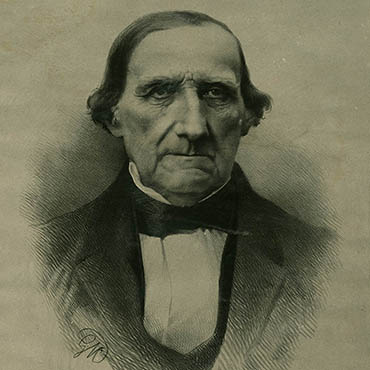Santini was born in 1787 in a hamlet in what is now Caprese Michelangelo, in the province of Arezzo, the third sibling of a large and relatively poor family. After an early education provided by his father’s brother, who was parish priest near Santini’s hamlet and who had welcomed Giovanni to live in his house, he was sent by his uncle first to the seminary in Prato and then to the University of Pisa, where he became aware of his interest in mathematics and astronomy. He left Pisa without a degree in order to go to the Brera Observatory, at the time managed by Barnaba Oriani, and then, at the young age of nineteen, he was given the position of assistant astronomer at the Observatory in Padua, founded by Giuseppe Toaldo. A few years later Santini was compelled to manage it all by himself without any guidance from the director Vincenzo Chiminello, by that time old and struggling.
As an astronomer Santini applied himself to the study of the dwarf planets, which at the time was a cutting-edge topic, concentrating in particular on Vesta, but also on Ceres, Juno and Pallas. This made the Padua Observatory a centre of study of European importance for positional astronomy, partly thanks to the new instrumentation that he made available through the purchase of equipment of the latest generation. In 1813 he obtained the chair of theoretical and practical astronomy and a few years later succeeded Chiminello as director of the Observatory. He became one of the greatest astronomers in Europe and was a member of the most prestigious academies. He held important positions also within the University, being for almost thirty years director of the Faculty of Mathematics, from 1845 to 1872, and holding on two occasions the position of president. He was a gifted teacher, a quality that the many generations of students that passed through the University of Padua always appreciated. He left behind important contributions on comets as well, apart from treatises on astronomy and optical instrumentation.
Giovanni Santini died in 1877 in a villa he had bought at Noventa Padovana, after spending most of his life within the Observatory. Antonio Favaro, who was sixty years younger than Santini, was able to know him only for a short time, on account of the ripe old age reached by the elderly professor. Nevertheless, he always acknowledged the major role that Santini had played in the development of mathematical studies in the university where he had been student and then professor, and his lasting influence on the students of the previous generation, including his own teacher (and later father-in-law) Domenico Turazza. In the booklet on L’Università di Padova, in which in 1922 Favaro celebrated the 700 years from its foundation, he described Giovanni Santini as a «teacher in the true and broadest sense of the word […], who for over half a century had run the Astronomical Observatory, and a scientist of European fame, whose lectures were used as teaching texts in many of the major universities”.


